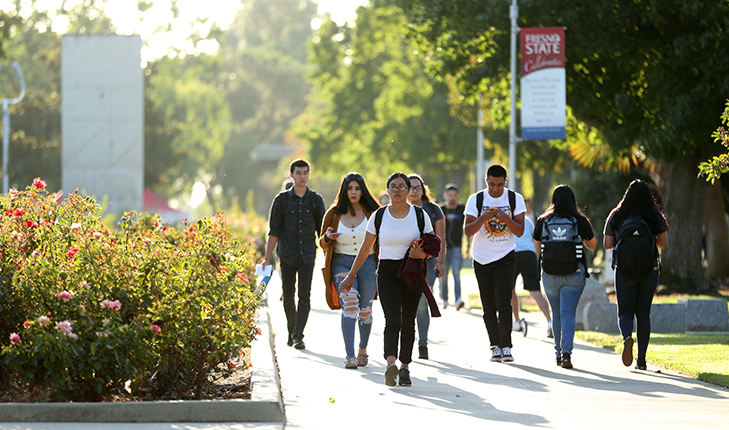Fresno State is among the best nationwide at educating and preparing low-income and first-generation students to earn their degrees and find financial success, according to the 2019 Social Mobility Index.
For the third consecutive year, Fresno State placed among the top five best universities for social mobility, ranking No. 3 out of 1,458 schools behind top-ranked Baruch College in New York and California State University, Los Angeles.
Fresno State is one of four California State University campuses that has placed in the top 20 for each of the past six years, showing that access to higher education creates opportunities for individuals to move from one socioeconomic class to another.
“Unlike other college rankings that are aimed primarily at helping students select a college the [Social Mobility Index] helps families and policymakers determine which colleges are addressing the national problem of economic mobility,” said CollegeNET President Jim Wolfston. “Administrators have a better chance to help strengthen U.S. economic mobility and the promise of the American dream if they can identify and learn from colleges that are skilled at doing this.”
Last year, Fresno State ranked No. 4 and, in 2017, it ranked No. 3. Public schools in California — from the CSU and the University of California system — dominated the 2019 rankings, accounting for more than half of the top 20 spots.
Students like recent Fresno State graduate Ana Dominguez show what is possible despite many life challenges. She remembers going to bed hungry as a child when her mother lost her job due to an injury. Dominguez grew up in the small city of Huron where only a quarter of the residents graduate from high school, according to the 2018 American Community Survey.
But determined to succeed, Dominguez graduated this past May with two degrees in political science and criminology while raising a young son who once attended class with her. Dominguez is now pursuing a law degree.
The Social Mobility Index, developed by PayScale and CollegeNET, measures the extent to which a college or university educates more economically disadvantaged students at lower tuition, so they can graduate and get good paying jobs.
Five criteria are used to determine the rankings, including tuition cost, economic background, graduation rate, early career salary and the size of a school’s endowment. Data was collected through third-party sources such as Payscale, Inc. and the Integrated Postsecondary Education Data System.
“We are committed to providing a high-quality education for all of our talented students, while intentionally working to ensure that the average loan indebtedness of our graduates remains significantly lower than the national average,” said Fresno State President Joseph I. Castro. “That powerful combination drives economic inclusion and social mobility throughout California’s Central Valley and beyond.”
Like Dominguez, Jason Her grew up in poverty, surrounded by gangs and did not have a strong family support system. He served for a decade in the military instead of going to college. But when he got out of the military, Her realized that “education is an opportunity for us to get somewhere in life.”
He came to Fresno State as a transfer student, attending classes during the academic year and during Fresno State’s winter intersession and summer session to finish in two years. Her graduated in May and is working on a master’s degree in social work.
This latest ranking continues a streak of national recognition for Fresno State this year. The University scored third-highest among public national universities for graduation-rate performance in U.S. News and World Report’s 2020 Best College rankings, was No. 24 in Washington Monthly’s top 25 and ranked No. 35 in Money Magazine’s 50 Best Public Colleges.





